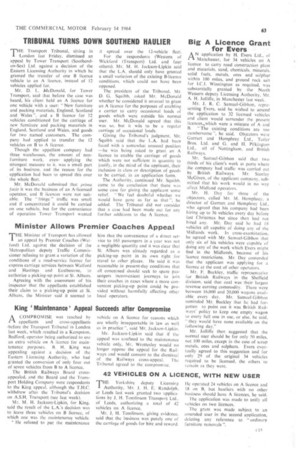Big A Licence Grant for Evers.
Page 65

If you've noticed an error in this article please click here to report it so we can fix it.
AN application by H. Evers Ltd., of Manchester, for 34 vehicles on A licence to carry road construction plant and materials, sand, chemicals, mineralS, solid fuels, metals, ores and sulphur within 100 miles, and ground rock salt for I.C.E. Winnington as required, was substantially granted by the North Western deputy. Licensing Authority, Mr.
A. H. Jolliffe, in Manchester last week.
Mr. J. R. C. Samuel-Gibbon, representing Evers, said he wished to amend the application to 32 licensed vehicles and client would surrender the present licences,which were a mixttire of A and
B. 'The existing conditions are too cumbersome", he said. Objectors were Garrart and Hemphrey Ltd., Tatter Bros. Ltd. and G. and H. Pilkington Ltd., all of Nottingham, and British Railways.
Mr. Samuel-Gibbon said that two thirds of his client's work at ports where the company had traffic was carried out by British Railways. Mr. Stanley McGiven, of the applicant company, submitted that his work would in no way affect Midland operators.
Mr. H. Day for three of the objectors, called Mr. M. Hemphrey, a director of Garrart and Hemphrey Ltd., who agreed that his company had been hiring up to 36 vehicles every day before last Christmas but since then had not hired any. Mr. Day said he had IS vehicles all capable of doing any of the Midlands work. In cross-examination, he agreed with Mr. Samuel-Gibbon that only six of his vehicleswere capable of doing any of the work which Evers might find irt the Midlands, because of his licence restrictions. Mr. Day contended that the applicant was applying for a licence at the cost of other operators.
Mr. F. Buckley, traffic representative for British Railways in the Sheffield division, said that coal was their-largest revenue earning commodity. There were between 16.000 and 20,000 wagons available every day. Mr. Samuel-Gibbon reminded Mr. Buckley that he had forgotten to point out it was British Railways' policy to keep one empty wagon to every full one in use, or else, he said, " they would have none available on the following day."
Mr. Jolliffe then suggested that the normal user should be for only 50 miles. not 100 miles, except in the case of scrap metals, ores and sulphurs. Evers eventually agreed to this suggestion and for only 29 of the original 34 vehicles required to be licensed, the others to remain as they were.
















































































































































































